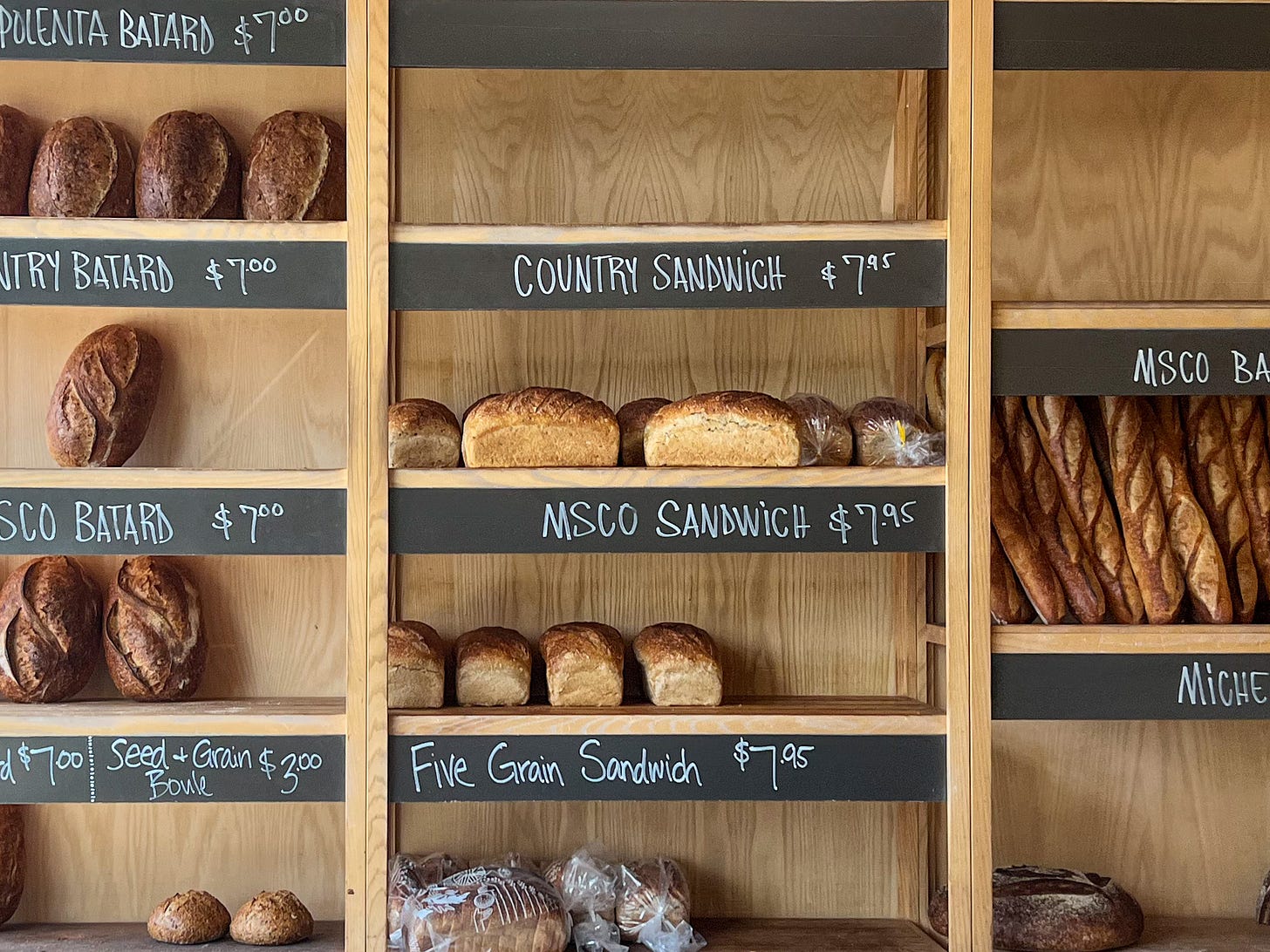For Madison Sourdough, A Union Offers Protection and Certainty
How one bakery's union win affirms that everyone has the right to organize at work—originally published in Tone Madison
Hi friends! Today I’m republishing a piece I wrote for Tone Madison, an incredibly cool, independent publication that covers politics and culture. I wanted to write this piece about the amazing organizing the workers at Madison Sourdough, a local bakery, were doing, but I also wanted to hit on some common anti-union themes I see people discuss—like how service workers don’t need a union, or that “benevolent” leaders shouldn’t need their workers to unionize.
I was inspired to write this for Tone after reading an article it ran by JT Cestkowski about the state of coffee shops unions in Wisconsin. I knew this outlet would let me challenge big ideas about unions, and tell some incredible stories. Even if you don’t live in Madison, you should check out Tone and support your local independent publications. And if you want to support this particular publication, please consider upgrading your subscription from a free to a paid model:
Ever since Madison Sourdough’s employees announced they intended to unionize in early March, Lolo Young says most customers have expressed support.
“The vast majority of customer response has been very positive,” says Young, a baker who has been with the east side bakery and café for over a year. “I’m not in the front of house, so I don’t speak to customers daily, but folks in the front of house have told me that people have come in saying, ‘Good luck,’ ‘Congratulations,’ ‘Well done,’—that sort of thing. So that’s really good to hear.”
The United Food & Commercial Workers Union (UFCW) Local 1473 filed a petition to unionize on behalf of the workers on February 28, 2023. Madison Sourdough owner Andrew Hutchinson declined to recognize the union voluntarily, forcing workers to hold an election on April 5. Out of 47 employees, 40 were eligible to vote for unionization. The union won 27 to 13.
“I was super excited to see that we had a whopping 100% turnout and we won the election pretty handedly,” says Spencer Schlenker, a Madison Sourdough baker.
Young affirms Schlenker’s excitement:
“I’m incredibly proud of all my fellow workers for all the effort and solidarity it took to stand up and stay strong through the election,” Young told me after the election.
The next step is to negotiate a contract and bargain with Madison Sourdough’s leadership team, a process that can take months, but Young is hopeful that it will go smoothly.
“We look forward to bargaining a strong contract that takes care of all MSCO [Madison Sourdough] workers, in good faith, as management has said they would/will since we filed for an election,” says Young.
“I intend to bargain in good faith and look forward to securing a contract that everybody agrees upon,” said Hutchinson in an email to Tone Madison after the election. “The election process was painful and strenuous and I know it isn’t the process everybody wanted to go through, myself included, but I felt it was the only way for all employees to voice their opinion on union representation. I believe that beyond contract negotiations, repairing relationships, mending divisions, and rebuilding the positive work environment that everyone wants to uphold is my primary goal for the coming year.”
In the lead-up to the election, in-person and online reactions were generally encouraging, but a small minority of responses were less supportive, challenging the need for a union at all.
“The thing is this small bakery in Madison is not a chain coffee house. Just talk to the owner. He’s a really cool and nice decent guy,” wrote one commenter on a March 2 Cap Times story on the unionization drive. “The people who are running this union idea are bored idealist[s] with too much time on their hands.”
The arguments against the Madison Sourdough effort, albeit in the minority of public opinion, demonstrate that some believe unions are necessary to protect workers against “bad” working conditions. But many at Madison Sourdough say they love their jobs, adore their colleagues, and see a union as a way to ensure their working conditions stay positive and that workers have a voice to steer their future.
“For most of us, this is the best job we’ve ever had,” says Young. “And for us, the action that we’re trying to take here is to ensure that it stays that way and to show how much we want to keep these jobs and how much we want to continue making Madison Sourdough a great place. To be met with pushback is disappointing.”
A fundamental right
National union support is the highest it has been in decades; a 2022 Gallup poll shows that 71% of Americans support unions, the highest approval rating since 1965. The drive to unionize Starbucks locations across the country has dominated news outlets for months, inspiring many smaller coffee shops to pursue union contracts. According to the National Labor Relations Board (NLRB), union petitions are up 53%, from 1,638 petitions filed in the 2021 fiscal year to 2,510 in 2022, with Starbucks stores representing 20% of all filings in the last year. As of this writing, 387 stores have filed petitions to unionize, with 293 stores winning their union vote.
In the Midwest, the workers of Colectivo Coffee formed the largest coffee shop union in the nation, covering workers across 20 locations in Madison, Milwaukee, and Chicago. 2022 has been one of the most active years for union organizing both nationally and locally, which we’ve covered extensively at Tone Madison.
It was partially the Starbucks union—along with other service-industry-focused organizing—that inspired Cal Pryde, a Madison Sourdough dishwasher, to consider organizing as an option.
“I’ve always been very interested in labor struggles. I’ve been following a lot of the labor organizing in the gaming industry because I’m a big gamer,” they say. “Then, seeing the Starbucks drive made me realize, ‘Oh, you can do that in the food service industry.’ I didn’t think you could do that before.”
In many cases, a union drive is a response to a hostile or dysfunctional workplace. But the overwhelming sentiment amongst Madison Sourdough workers is that they enjoy their jobs.
“I wouldn’t have worked at Madison Sourdough for almost four years if I didn’t want to work there,” says Pryde. “This has been one of the best food service jobs I have ever had. And one of my main reasons for wanting to unionize is to keep it that way.”
In the case of Starbucks vs. workers, there’s a clear villain and hero: With over 9,000 locations, Starbucks represents a behemoth of an organization, and media attention has rightfully focused on egregious allegations of anti-union retaliation—much of which have been met with minimal actionable consequences. Starbucks has been able to throw its weight, power, and money at thwarting unions. Still, when it comes to smaller businesses, the lack of a clear hero vs. villain narrative seems to drive questions of what a union is meant to achieve.
“Everybody deserves a union. Everyone deserves an equal say in their workplace at any level,” says Ryan Neibauer, Political Director at Local 494, International Brotherhood of Electrical Workers (IBEW), the union representing the unionized workers at Colectivo here in Wisconsin (Illinois-based Colectivo workers are represented by IBEW Local 1220). “It comes down to workers wanting equal respect, opportunity, and a say in their destiny—unions allow that to happen.”
Workers are waiting until they sit at the bargaining table to discuss specific grievances, but are clear their objective is to seek a positive outcome for both workers and management.
“We want this business to do well. A union isn’t there to run a business out of business. We want the employees to be happy, the bosses to be happy, and for the business to make money,” says Pryde. “All we’re asking for is to keep our great work situation as good as it is and to have more power to bargain with our bosses. That’s what this boils down to.”
The safety of a contract
Schlenker is an experienced baker and was proud to land at Madison Sourdough after leaving North Carolina in December 2022.
“I love the feeling of telling someone, ‘I’m a baker, and I work at Madison Sourdough,’ and their reaction is always, ‘Oh my God, I love that place,’” Schlenker says.
For him, a contract represents a tangible safeguard for employees.
“I’m interested in having a contract, so I’m not just another number on a spreadsheet that can be replaced,” he says. “I don’t want a change in management or ownership years or months down the line to mean that I could be replaced by someone who’ll do my job for cheaper. That’s the kind of security that I’m personally looking for.”
Unionizing workers say that without a contract, their workplace conditions can be changed without notice.
“I have no reason to think that the current management at Madison Sourdough would make commitments that they don’t intend to keep,” says Schlenker. “Nonetheless, I still want everything written down. A contract provides real security for the future.”
The United States has some of the weakest worker protection laws in the world. “In the United States, employees without a written contract generally can be fired for good cause, bad cause, or no cause at all,” writes attorney Charles J. Murl for the Monthly Labor Review, a publication from the U.S. Bureau of Labor Statistics. In all but one state, workers are often classified as “at-will employees,” meaning employers can fire them for nearly any reason. Some protections are in place to prevent employers from engaging in discriminatory firing practices or using termination as a retaliatory practice, but in general, workers can be let go without much reason, and the conditions of their workplace can change at the drop of a hat.
“Some people might say you don’t need a union if your workplace is good,” says Schlenker. “But even if the contract we signed just kept things the way they are, there’s value in that.”
Workers are also seeking clear protocols and rules to remove ambiguity.
“Speaking for myself as a neurodivergent person, having everything clear and on the table makes my life much easier and less anxiety-inducing,” says Pryde. “For me, it’s all about having a clear contract that says our rights and knowing they are legally defined. Having something set in stone that everybody can use as a reference to know how scheduling works, hiring and firing practices—having it all out there and written down is appealing to me.”
Missing the point
Although many new union filings have been within the food and service sector, only about 4% of food service workers were part of a union in 2022. Part of that might be due to public perception of service industry jobs: despite the fact that service workers were deemed “essential workers” during the pandemic, some members of the public still view them as temporary or unskilled, and hostility towards frontline workers has only increased as COVID protocols wane.
“We’ve heard some people argue, ‘Oh, what do they need a union for? They just bake bread all day.’ We work 10-hour days, sometimes starting at 2 a.m.,” says Young. “It’s physical labor the entire time. It is not what I would describe as a cushy job—it’s hard work.”
Hutchinson told The Cap Times that learning the recipes and bread-baking techniques needed to work at Madison Sourdough can take up to three months. Madison Sourdough is a nationally recognized bakery with distribution across the state of Wisconsin. The learning curve is steep even for experienced bakers.
“Management said that it takes three months to train a baker. I would say it takes three months to train someone who has baked already on how we bake,” says Young. “For someone who just walked in off the street, it would be six months, nine months, a year until you feel confident in this bakery. It’s very much skilled work. Many of the people who work in both the bread and pastry kitchens have graduated from culinary school. It’s a skilled job.”
But Young quickly notes that the right to unionize shouldn’t be based on the perceived skill level of one’s position.
“To call some work skilled and other work unskilled—that’s kind of a red herring, right?” she asks. “It’s people’s time; people’s time is valuable, and people’s labor is valuable. Everybody deserves a quality of life no matter what they do. If you’re laboring at a job, you deserve a decent quality of life.”
Regardless of position or tenure, the workers at Madison Sourdough continue to reiterate fundamental arguments about equity and dignity for all workers. “Does not every worker deserve a fair quality of life and a fair contract?” asks Young. “Small business, big business, two employees, 40 employees, a million employees—every worker deserves a fair quality of life and a fair contract.”
Balancing power
In the lead-up to the election, Madison Sourdough workers noted they saw typical anti-union rhetoric seeping into the conversation.
“We are absolutely seeing union-busting [behaviors],” Young said before the vote. “I’m not afraid to use those words—it is what we are seeing. It’s a sad thing to see.”
According to the NLRB website, Madison Sourdough retained Littler Mendelson, PC, as its legal representative during the unionization process. Littler Mendelson is also representing Starbucks during its labor disputes; in a Senate hearing to discuss the megachain’s alleged anti-union actions, Sen. Bob Casey of Pennsylvania described the firm as “one of the largest and most notorious union-busting firms in the country that reportedly charges upwards of $600 an hour for their services.”
Arguments like the complaint that the union is a “third party” are common anti-union talking points that get thrown around within a business or organization, but outside of Madison Sourdough—and outside of any organization—observers’ casual comments also veer into common anti-union ideas.
“Another piece of rhetoric we’ve heard is that the only people who wanted a union are the new people who have only been here for six months,” says Pryde, who has been with Madison Sourdough since 2018. “And as one of the people who’s been working there for quite a few years now, I want this, and I’m in solidarity with my employees.”
Other common arguments against a union—like the expense of union dues or the notion that problems can be better solved one-on-one—mask the central tension between employers and workers: Employers have most of the power, and even if you establish trust and camaraderie with your employer, there’s still an imbalance of power. “I’ve had nothing but decent working relationships with my boss and the kitchen management—but people are people, and that can change,” says Pryde. “I would rather have a thing written down ensuring that you can’t fire me if our relationship changes. In a relationship between the boss and the employee, the only person with power is the boss because they have firing power.”
“Unions create balance, which can help address disparities in a workplace,” says Neibauer, noting that union membership has helped address wage disparities amongst members of marginalized groups: Unions help narrow gender and race wage gaps and increase wealth for all workers. “Unions provide power to the powerless, and that ripples outward.”
A better workplace for all
Organizing workers at Madison Sourdough believe a union is good for everyone—not just employees. “There are some outside observers worried about how this might affect the business. But a union can be good for a business, especially in a place like Madison, because people will show up and support the workers,” says Schlenker. “It’s about working with management to ensure everybody is happy and that the business is successful. It’s a two-way street.”
“One of the talking points I see is, ‘Oh, there goes Madison Sourdough,’ like the union represents the beginning of the end,” says Young. “That is entirely antithetical to what we’re doing here. Madison Sourdough is not just management’s livelihood. It is—quite literally—all of our livelihoods. The last thing we want to do is see Madison Sourdough suffer, and we won’t vote for a contract that will hurt the business. We’re only here to ensure that we’re taken care of while this business succeeds and to help the business succeed so we can succeed.”
Sometimes the journey towards unionization can feel like an opposition of forces, especially when you look at organizing as a zero-sum game: either the union wins, or management does. But the workers at Madison Sourdough are telling a different tale, one where rising tides lift all boats. Unionizing is less about picking sides, or analyzing whether or not people deserve or need a union.
“A big part of our push to unionize is about positivity and solidarity,” says Schlenker. “It’s not about trying to get back at the owner for something they did. It’s not about trying to punish people working in management. We just want a seat at the table to ensure we are treated fairly as we build our careers here.”
Pryde hopes the win at Madison Sourdough encourages others like them—who were unsure or even unaware that they could unionize their workplaces.
“I’m really proud of all my coworkers and I hope that this is a wake up call to other people in Madison who want to unionize but think it’s too hard,” they said. “If we can do it, so can they!”







This is a really great piece, Ashley.
Please do a follow-up, Ashley, when the contract is negotiated and approved. The terms of the contract will be the most reliable indicator of the continued success or future demise of these peoples' employer!